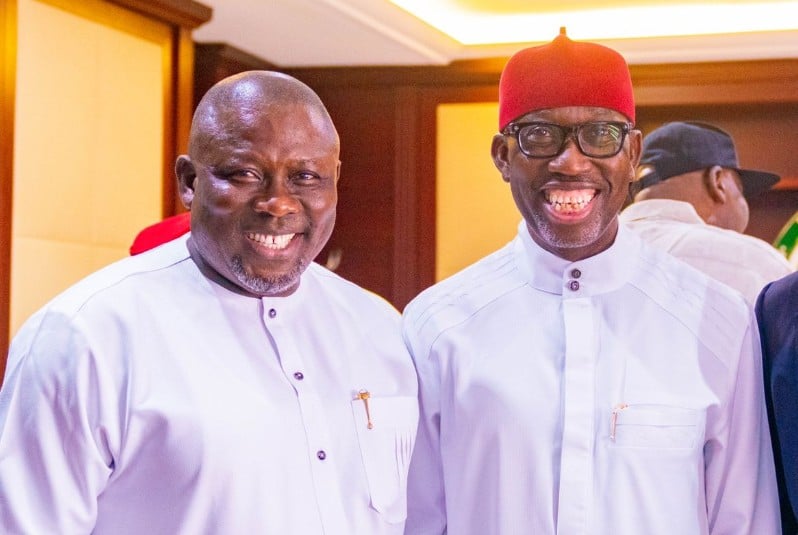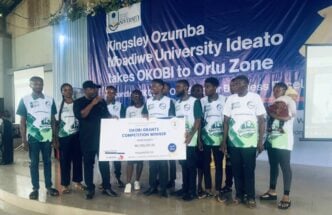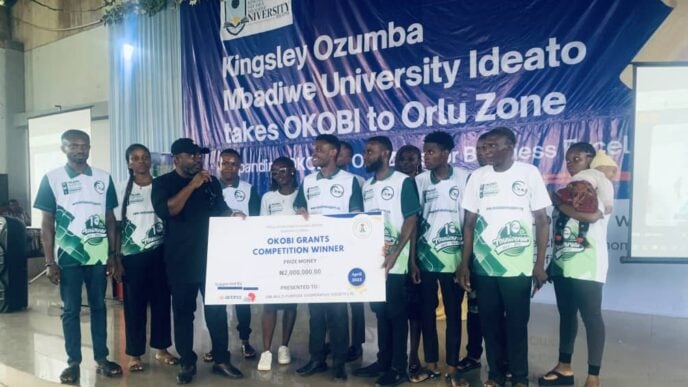Sheriff Oborevwori and Ifeanyi Okowa
Is there morality in politics? Or, should there be morality in politics? Governors of Akwa-Ibom and Delta states, Umo Eno, Sheriff Oborevwori and ex-governor of Delta state, Ifeanyi Okowa, are of the opinion that there isn’t. Or, there shouldn’t be. They made this known last week in epistles that should be fittingly entitled, “An ode to betrayal and betrayers”. Like blabbering kid thieves caught stealing from a pot of soup, Eno and Okowa waffled pitifully, in a manner that beggars belief, on why they abandoned/abandoning the PDP, a faithful political kin, which threw them up from obscurity to prominence and redoubtable wealth. They seem to be oblivious of Emeritus Professor of Psychology, Macquarie University, Australia, Julie Fitness’ quip in her “Betrayal, Rejection, Revenge, and Forgiveness: An Interpersonal Script Approach” that, “Throughout recorded human history, treachery and betrayal have been considered among the very worst offences people could commit against their kith and kin”.
When the discourse is about betrayal and betrayers, my people walk a profound path. They recourse to an allegory which carves an imperishable place of pride for a faithful animal, the pigeon, Ẹyẹlé. With this, they paint the distastefulness and horrid colour of betrayal. In the ode to this evergreen bird, they hold aloft her fidelity to an unwritten bond of friendship. So, my people say, the Ẹyẹlé, which daily eats and drinks from the House Owner in time of plenty, will not break that bond even when the House Owner faces life’s existential travails.
Political Iscariotism has become a punishing phenomenon in Nigerian politics. On a national television last week, former PDP presidential running mate, Okowa sought all manner of ways to legitimise why a pigeon should abandon the House Owner in his autumn, his moment of decline. Asked what he found in the pot of soup that made him cup his hand suggestively, Okowa said the move was in the best interest of Delta state, “the need for us to connect to Abuja, that goodwill… that resource that’s in Abuja of which Delta State is a large contributor.” For once, forget this oesophagus politics of “connect”, one of Okowa’s lines of defence for his political acrobatics was that ex-Senate President, Bukola Saraki, had earlier trodden same path, a case of my adultery is lesser than yours, if you like.
In the same way, Pastor Umo Eno, governor of a state whose successive governments have repeatedly mouthed their wedge to PDP as “the state’s religion”, found ideology as the 30 shekels to collect for betraying the PDP and his people. He found a troubling anecdote to tell about a traveler and two airlines for a reinforcement of his blabbering thesis. At a town hall meeting held for the Ukanafun Federal Constituency last Tuesday, speaking in Ibiobio, Eno said: “You are about to board a flight to Lagos from Uyo, and you see Air Peace and Ibom Air. Ibom Air develops faults while trying to take off and disembark its passengers. But Air Peace is ready to fly to Lagos, would you cancel your flight to Lagos because you do not want to use Air Peace and wait till Ibom Air is fixed before you travel to Lagos? Would you do that? Board a flight, disregard the name of the plane. Go to Lagos if you have business you want to do. When Ibom Air is fixed, and you want to fly another day, you can fly with them. But if you have an important business, board the available plane and fly.” Apparently seeing the need to reify his betrayal epistemology, Eno thereafter appeared on a radio station programme where he attempted to demonize ideology in Nigerian politics.
Advertisement
The bible, which Eno reads, is very profound in telling the story of betrayers and betrayal. Bible scholars say in that holy book are 50 verses about betrayal. It runs from the story of the patron-saint of betrayal, Judas Iscariot, Delilah and the Philistines, David’s betrayal of Saul, the Absalom story and repeated pronouncements like “Brother will betray brother to death, and a father his child, and children will rise up against parents…” If the bible were to be re-written today, with Eno’s betrayal in mind, his unkind cut of betrayal of a party that brought him from obscurity to limelight would make the 51st story of betrayal.
Traditional African society abhors betrayal. In an ancient aphorism, my people ask that the tree that is leaned upon for support should be magnanimous enough to warn one off if it would suffer a fall. Modern relations also scoff at these twin leprosies. Dragos Avandanei, writing in “Literature’s Loyalty to Betrayal” (2018) plotted the graph of how, in ancient and modern literature, writers have always engaged the concept of betrayal and see betrayers as scoundrels. Citing Karin Altenberg’s quip which says that “Betrayal seeps through literature like a dark stain…” in his Top 10 Books About Betrayal, (2015) Avandanei submitted that, “betrayal (has been) a fundamental theme or motif in literature—literature in general, from the first known such work, Gilgamesh, through Greek and Roman mythology, fairy tales and folk tales, medieval romances, Dante, Cervantes and Shakespeare, to Goethe, Tolstoy and Joyce, to Anne Sexton and Philip Levine.”
Literature, continues Avandanei, is riddled with thematic occupation of betrayal and its synonyms like “treason, treachery, deceit, dishonesty, duplicity, perfidy, infidelity, crime, trickery, cheat, hypocrisy, cunning, backstabbing, conspiracy, disloyalty,” more than literature has ever dealt with themes of betrayal’s positive antonyms like “trust, loyalty, honesty, truthfulness, devotion, fidelity, innocence, friendship and the rest.” Greek literature is pockmarked by betrayals at every turn. You had Aeneas betray Dido, Clytemnestra betrays Agamemnon and Ephialtes betrays the Spartan in how he helped the Persians at the battle of Thermophylae. In The Epic of Gilgamesh for instance, which has come to be known as a great work of literature, a story of the god-hero of Uruk, Mesopotamia, we learn the importance of loyalty and friendship as depicted by Gilgamesh and Enkidu, as well as consequences for violating implicit trust. This was revealed in Hierodule’s seduction of Enkidu or Gilgamesh’s betrayal of the goddess of love, Ishtar. In virtually all Shakespeare’s books, themes of betrayal are eminent in them as he examined tragedies that come from betrayals.
Advertisement
Whether in literature, politics or everyday life, betrayal provides no variation. Betrayal signifies the breaking or violation of presumptive contract, trust or confidence. This break produces moral and psychological conflict in a relationship. It could be between organizations, individuals or vice versa, but its common denominator is that, support is rendered to a rival group, in violation of support for the previous. Whatever sphere it is recorded, betrayal results in extreme social distress and disrupts established mental model. Betrayal also ruptures trust and contaminates relationships.
But politicians, trying to be clever by half, say that in politics, unlike literature or our everyday relations, betrayal isn’t an anomaly but the water with which they bathe. To escape from the damnation awaiting betrayals, they make a distinction between betrayal and what is called “political compromise.” Politics, they say, is an art of compromise, give-and-take, if you like. In the end, politicians leave us with a paradox, especially in their saying that, what is politically expedient, though may not be morally admirable, is not immoral. With this, Nigerian politicians have drawn a different world for themselves, a world where there are no standards of political excellence, while leaving us to idealize political integrity as Utopian. That is why in Nigerian politics, loyalty to a cause is as scarce as a hen’s teeth and loyal politicians as rare as snakes in Ireland. Against what Angadipuram Appadorai taught us in his Substance of Politics (1968), Nigerian politicians have redefined moral integrity as different from political integrity.
However, while political Iscariotism of the kind of Umo, Oborevwori and Okowa is self-serving, the ones of pre-independence Nigeria was ideological. The first documented case of cross-carpeting, or “decamping,” a Nigerian word for switching of political party allegiance, was recorded in 1941. It was at the feisty contest for a vacant seat in Nigeria’s Legislative Council vacated by Dr. K.A. Abayomi. The contest pitted Ernest Ikoli, an Ijaw, against Samuel Akisanya, with the former emerging victorious, though Akisanya polled 108 votes as against Ikoli’s 60 votes. This incensed the Eastern and Southern supporters of Akisanya and especially his Ijebu Yoruba kin who, in 1941, pulled out of the Nigerian Youth Movement (NYM), Nigeria’s first genuine nationalist organization founded in 1934, in protest against the announced victory of Okoli. Nnamdi Azikiwe was one of them who left NYM to join forces with Herbert Macaulay in forming the NCNC.
The second case of decamping happened in 1951. With Nnamdi Azikiwe of the NCNC ostensibly coasting home to victory, having won 42 out of 80 seats to produce the highest number of members in the Western Regional House of Assembly, the Action Group infiltrated Azikiwe party members and succeeded in securing their decamping. Within 24 hours, 20 NCNC members decamped to the AG, ultimately halting Azikiwe’s majority needed to become Premier and giving the AG enough membership leverage to secure majority in the parliament.
Advertisement
Another very epochal case of decamping happened during the First Republic. As a result of the political tiff within the AG, the Western Region Premier, Chief Ladoke Akintola, and his rump of party faithful moved over to form the United Progressive Party, (UPP) which later formed an alliance with the NCNC to become the Nigerian National Democratic Party (NNDP). In the same vein, a political clash between Azikiwe and Dr. Kingsley Ozumba Mbadiwe also resulted in Mbadiwe breaking away from the NCNC to form the Democratic Party of Nigeria Citizens (DPNC).
In the short-lived Second Republic of 1979 to 1983, a gale of political defections also occurred. The most epochal of them was the shifting of alliance from the Unity Party of Nigeria (UPN) to the to the ruling National Party of Nigeria (NPN) by Ondo State Deputy Governor, Chief Akin Omobioriowo with allies like Olaiya Fagbamigbe. The other was that of Alhaji Abubakar Rimi, governor of Kano State. Elected on the platform the Peoples Redemption Party, (PRP) Rimi was bold, courageous and never shied away from upsetting established orthodoxies. He formed the first “All Graduates Cabinet” comprising the likes of Alhaji Sule Yahaya Hamma. He was credited with abolishing the personal tax called haraji and cattle tax, jangali which were inherited colonial taxes. He also suspended the Emir of Kano, a decision that led to the Kano riots of July 1981 and the murder, on July 10, of his Political Advisor, Dr. Bala Mohammed Bauchi, and the burning of the Triumph Newspapers, Radio Kano, and several ministries.
Rimi however fell out with his political mentor, Mallam Aminu Kano in May 1983 and decamped from the PRP, under whose banner he became governor, to the Nigerian People’s Party (NPP) to contest the 1983 elections. As an underscore of the political morality obtainable at this time, Rimi resigned his position as Kano State governor since he was leaving the party under whose banner he vied for the governorship ticket and was subsequently replaced by his deputy, Abdu Dawakin Tofa.
But, progressively, the colour of virtuous politicking in Nigeria waned, leading to shameless harlotry as a political credo. Okowa, Oberevwori and Eno’s epistles on leaving their political parties were hollow, feckless and irritating. Yes, today, the PDP, like the anecdote of Ẹyẹlé and the House Owner, is facing its most harrowing political time ever, due to mismanagement, greed and power recklessness. Like mortal man who never learns, the APC is embroiled in same hubris, relishing its own self-proclaimed power immortality. Virtually all the PDP Ẹyẹlé, who supped and dined with it at a time of plenty, have abandoned the House.
Advertisement
The dearth of ideology in Nigerian politics is reputed to be the culprit of the political vagrancy that is worn shamelessly by politicians on their lapels. Though when it catches their fancy, especially in their manifestos, Nigerian politicians revel in superficial classifications and inappropriate self-labeling of their political stands as “progressive” and “conservative”, and “left” and “right”, there are no ideological commitments in Nigerian politics. This is worsened by a chronic identity and money politics in Nigerian party politics, gross indiscipline, parochial and selfish politics, high turnover and mortality rate of political parties and their leaderships, as well as death of internal democracy. These are the identifiers and hallmarks of Nigerian politics. Yet, if we continue to be drowned by these ills and do not get party politics right, no meaningful development can be made in Nigeria. Not only are parties one of the most complex and critical institutions of democracy, many scholars have referred to them as “makers” of democracy. The sacral place political parties enjoy in the quest for democracy is such that some scholars claim that democracy and democratic societies’ existences are unthinkable without political parties.
As divorcees consistently blame individual spouses for their marital fatality, Eno and Okowa hold ideology responsible for their defection. However, central to the existence of political parties is the place of political ideology. Talking of its importance, Anson D. Morse (1896) argued that ideology is a durable conviction held in unison by party members, a bargaining chip for party unity, while Okudiba Nnoli (2003) describes it as a mirror with which a party looks at society. Ideology is a political party’s vehicle, its moral lens/mirror/compass with which it sees the outside world. It may sound scary but the truth is, we can never get Nigerian development right unless morality and ideology return to Nigerian politics.
Advertisement
You may disparage PDP as I do; you may not even be able to stand the cantankerous Labour Party as I cannot. The truth, however, is that, if Nigerian opposition parties do not get their acts together, we may be doomed to stagnation. We then will have more Enos, Oborevworis and Okowas who invariable give the APC and its Leviathan opportunity to fertilise the ground for the building of a cult of personality. It is the first step towards a totalitarian state.
Tinubu’s Àjàntálá son
Advertisement
Through its ancient mythology, Yoruba had a counterpoise of the western Frankenstein monster. Its is a negatively phenomenal child called Àjàntálá. In folklore and as a cultural signifier, the Àjàntálá was a misbegotten child, a product of his father’s disobedience to the un-science of, though life-shaping, ancient epistemology and practices. Àjàntálá’s hunter father had disobeyed widely held myth that when hunters’ wives were pregnant, they should cease hunting. The belief was that, if they shot a cantankerous game, it may, in anger, displace the foetus inside their wives and become a perilous child. This was the process that birthed Àjàntálá.
In the Amos Tutuola version of Àjàntálá’s story (Àjàntálá, the noxious child: 1986), the baby spent 23 years inside his mother’s womb. A few days before he was born, as his mother walked the bush path, the child began a conversation with her, even cavalierly suggesting its name at birth. Tutuola quoted Àjàntálá, as he emerged from the bloodied mass surrounding him from the womb, as saying, “Ha! Ha! Ha! This is how the world is! What did I come for then? I thought this world would be as beautiful as the heaven from where I came! Look at everything how it is very dirty! Of course, I will not keep long before I will go back to heaven!”
Advertisement
At his naming ceremony, the 8-day old child disrupted the proceedings, gluttonously consuming every food in sight and causing huge pains to his parents and all his naming ceremony attendees. As he grew, Àjàntálá manifested malevolent streaks, whipping his parents at intervals and beating to stupor a Babalawo, who was engaged to provide spiritual succour to his raving-mad Satanic theatrics. When his mother, tired of his wiles and the social stigma he caused the family, decided to trickily dump him in the forest, Àjàntálá encountered and became a family of the Goat, Ram and Lion and the discord he caused among them was phenomenal.
Two misbegotten children in the bible, Hophni and Phinehas, also manifested streaks that resembled Àjàntálá’s. They were the two sons of the high priest at the sanctuary of Shiloh in Jerusalem called Eli. The Bible described these children as “good-for-nothing” priests because they were not only corrupt and immoral, they brought their revered father huge shame. They did this through their abuse of priestly positions. The two went round wherever there were sacrifices to Yahweh and demanded excessive portions of the sacrifices. They were also renowned for sexual perversion and misconduct which brought dishonour to their father’s priestly office. At the apogee of their irresponsibility, these two Àjàntálás not only, by so doing, ended their lives in a tragic fall but were the ones who brought Elli’s priestly line to its doom.
Perhaps drawing its muse from these three disreputable children, a 1980s Ifá Olókun Television drama series created a character called Omolokun. Omolokun’s notoriety rivaled Ajantala, as well as Hophni and Phineas’. A product of undue haste for childbirth by a barren couple, Omolokun’s parents were eventually handed a child by a deity. This child then acted in every way like Ajantala, demanding every impossible thing under the earth, including “Odidi eni” – a human being. His thirst for the imponderables eventually led to his and his parents’ deaths.
My musical idol, Ayinla Omowura, late Yoruba Apala musician, while pillorying his truant first son, Akeem, also dwelled on the theme of Ajantala. He warned that an Ajantala child who lives a life of borderless splendour, misbehaviour and societal nuisance would soon lose all when “his mother goes fetching water and his father, to the farm,” a metaphor for an unscheduled forever-trip. Ayinla was soon to be killed after this Nostradamus prophecy.
Son of the Nigerian president, Seyi Tinubu, must be a pain to his father. In Nigeria’s history, I am not aware of any president’s child who has threatened public peace, public decency and the public space as Seyi. His name has come out in every socially distasteful national issue. You will recollect that this same young man was one who, but for his father’s peremptory scold, would probably have been attending Executive Council meetings with ministers. Seyi has no fog about precis in behaviour, so much that he outperforms himself in irresponsible behaviour. He is reputed to have nominated ministers and behaves in socially anomalous manner that baffles. Perhaps, the children of Muhammadu Buhari, who went watching the Durbar in presidential aircraft and shooting photographs with our national craft; the son of Sani Abacha, who commuted in Nigeria’s presidential aircraft like one taking peremptory trips in a Molue, can outperform Seyi in national irresponsibility. He causes so much stir with his long convoys of glittering automobiles and is chaperoned to occasions by Nigerian security apparatuses.
The latest about him is the allegation by the NANS President that Seyi ordered him tortured, beaten and his nude pictures taken for his voyeuristic pleasure. Though Seyi has denounced this, why would the president’s son always be associated with such shameful actions? In the APC, the youth wing is literally comatose with Seyi being alleged to have taken over the works of its executive. The Yoruba say if one’s yam farm posts bountiful harvest, a wise man would cover the heaps from prying eyes. As Seyi paints Nigeria in crimson as this, its reverberating effects bounce back on his father. Don’t Yoruba say it is the over-ripe orange that invites throwing of stones at its mother tree?
By the way, on Tuesday, May 6, Ayinla Omowura would be marking the 45th anniversary of his murder in a barroom feud. Famous podcaster and broadcaster, Edmund Obilo, held me to an almost 3-hour interview as I discussed the life and times of this bohemian musician. Please, watch out for the podcast.
Views expressed by contributors are strictly personal and not of TheCable.










